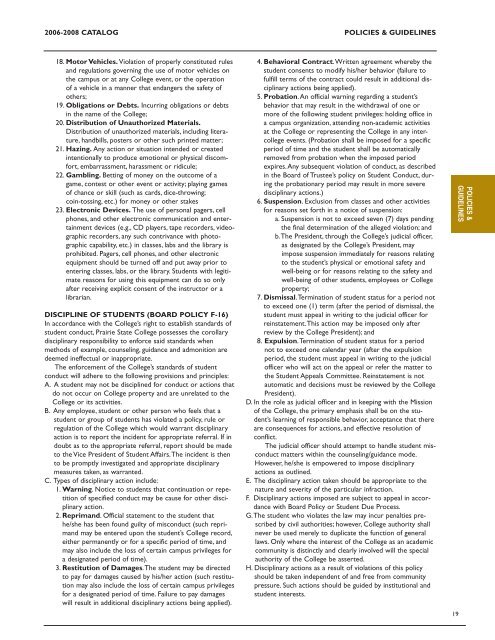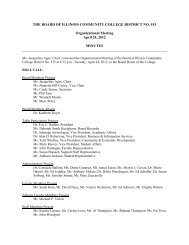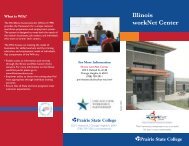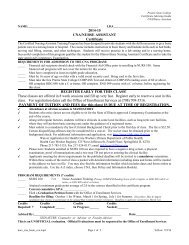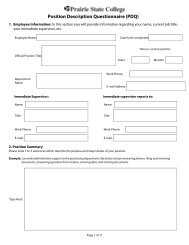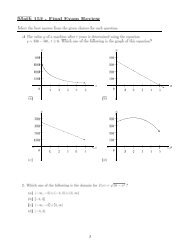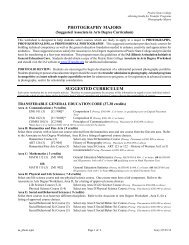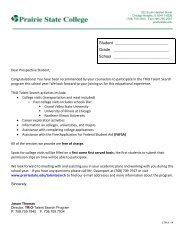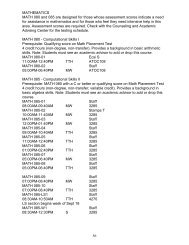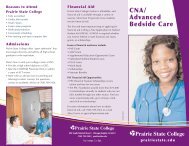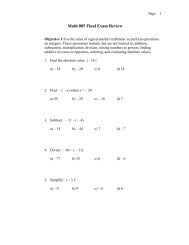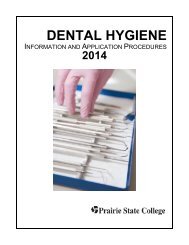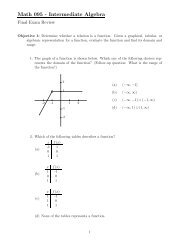POLICIES & GUIDELINES2006-2008 CATALOGPOLICIES &GUIDELINES18STUDENT RIGHTS & RESPONSIBILITIESAll students at <strong>Prairie</strong> <strong>State</strong> <strong>College</strong> are considered to beresponsible adults.Therefore, they are accountable for theirown personal behavior.The <strong>College</strong> expects students to beinformed about and obey local, state and federal laws and conformto the <strong>College</strong>’s standards of conduct. In affirming therights of its students, the <strong>College</strong> also affirms the obligations topreserve an atmosphere of orderly behavior and free exchangeof ideas and a respect for the rights and dignity of all of itsmembers.<strong>Prairie</strong> <strong>State</strong> <strong>College</strong> supports student rights of free inquiry,expression, association, peaceful assembly, redress of grievancesand due process.The exercise and preservation of these freedomsand rights require a respect for the rights of all in thecommunity. Students enrolling in the <strong>College</strong> assume an obligationto conduct themselves in a manner that is civil and compatiblewith the <strong>College</strong>’s function as an education institution. Itis clear that in a community of learning, willful disruption of theeducational process, destruction of property and interferencewith the orderly process of the <strong>College</strong>, or with the rights ofother members of the <strong>College</strong>, cannot be tolerated. In order tofulfill its functions of imparting and gaining knowledge, the<strong>College</strong> has the authority and responsibility to maintain orderwithin the <strong>College</strong> and to exclude those who are disruptive ofthe educational process.The <strong>College</strong> President shall be authorized to establishadministrative procedures to safeguard these rights and ensurethe discharge of these responsibilities.STUDENT CONDUCT (BOARD POLICY F-15)<strong>Prairie</strong> <strong>State</strong> <strong>College</strong> shall require a Code of Student Conductwhereby persons attending or visiting the <strong>College</strong> assume anobligation to conduct themselves in a manner compatible withthe <strong>College</strong>’s functioning as an educational institution.In accordance therewith, the <strong>College</strong> shall institute thefollowing Code of Student Conduct:A. Children are not to accompany students to classes or be leftunattended on campus, in <strong>College</strong> buildings or at any <strong>College</strong>event.B. Food, beverages, sleeping, card-playing, playing of personalradios/cassette/CD players, disruptive activity, misuse of furnitureor other property, and/or inappropriate interpersonalconduct for a public area are not permitted in the Atrium orother designated areas.C.The <strong>College</strong> shall be designated as a “Clean Air/Smoke-Free”environment.D.The <strong>College</strong> shall be designated as a “Safe School Zone” withzero tolerance for any violations of the law committed on thecampus or at any <strong>College</strong> activity.The <strong>College</strong> operatesaccording to the Safe School Act of 1984, which allows for a“Safe School Zone,” thereby prohibiting criminal activitiesfrom occurring within the boundaries of the <strong>College</strong> campus.E. Misconduct for which students may be asked to leave the<strong>College</strong> premises and be subject to official <strong>College</strong> disciplinaryactions fall into the following categories:1. False information. Furnishing false, incomplete or misleadinginformation to the <strong>College</strong> on official records oraltering official documents;2. Obstruction of <strong>College</strong> business and activities.Obstruction, unauthorized interruption or disruption ofthe business of the <strong>College</strong> or any <strong>College</strong> activity includingbut not limited to testing, research, teaching, or of theclassroom setting;3. Abuse/Assault/Harassment. Physical or verbal abuse,assault or harassment against a student, employee or anyother person on the campus or at any <strong>College</strong> event;conduct or expression that intimidates, threatens orendangers the health or safety of any person on thecampus or at any <strong>College</strong> event;4. Destruction of <strong>College</strong> Property. Unwarranted damageor destruction of property belonging to the <strong>College</strong>or to a member or guest of the <strong>College</strong>, including thatwhich is rented or leased;5. Theft. Unauthorized taking, embezzlement, misappropriationor possession of any <strong>College</strong>-owned property, theproperty of others, or property maintained by the<strong>College</strong> by any person on the campus or persons attendinga <strong>College</strong> event;6. Unauthorized Entry and Use of <strong>College</strong> Facilities.Unauthorized use, entry or occupancy of any <strong>College</strong>room, building or area of the <strong>College</strong> or any unauthorizedor improper use of the <strong>College</strong> property, facilityand equipment;7. Computer Information. Unauthorized or misuse ofcomputers, including damaging or altering records, furnishingfalse information, unauthorized use of files, programsor data without permission or any unauthorizeduse of computer hardware, software, accounts, passwordsor keys;8. Unauthorized Use or Possession of Keys.Unauthorized possession, duplication or use of keys ofthe <strong>College</strong>;9. Alcoholic Beverages. Possession, distribution or use ofalcoholic or intoxicating beverages on <strong>College</strong> property,except as authorized in accordance with <strong>College</strong> policy;10. Illicit Drugs and Controlled Substances. Use,unlawful manufacture, sale, possession or distribution ofillicit drugs and controlled substances on the campus orat any <strong>College</strong> event in accordance with local, state andfederal laws;11. Weapons on Campus. Use or possession of firearms,ammunition, other dangerous weapons or materials(except as expressly authorized by Board policy), andthe use of instruments to simulate such weapons in actswhich endanger or are reasonably likely to endanger anyperson;12. Fire Safety. Tampering with fire safety equipment, settingor causing unauthorized fires, or calling in or settingoff false fire alarms on campus or at any <strong>College</strong> event;13. Bribery. Bribery, accepting a bribe, or failure to reporta bribe by any member of the <strong>College</strong> community;14. Rights of Others. Interference with the lawful rightsof others to any <strong>College</strong> activity or <strong>College</strong> event;15. Conduct/Behavior. Disorderly behavior and/or lewd,indecent, dangerous, violent, unlawful or obscene conductor expression as defined in federal, state or localstatutes on the campus or at any <strong>College</strong> event;16. <strong>College</strong> Policies and Regulations. Violation of<strong>College</strong> policies or regulations;17. Failure to Comply with <strong>College</strong> Officials. Failure tocomply with directions of <strong>College</strong> officials, includingfaculty in assigned courses, when these officials are actingin performance of their duties and responsibilities andare requesting the student behave in accordance with<strong>College</strong> policies and regulations;
2006-2008 CATALOGPOLICIES & GUIDELINES18. Motor Vehicles. Violation of properly constituted rulesand regulations governing the use of motor vehicles onthe campus or at any <strong>College</strong> event, or the operationof a vehicle in a manner that endangers the safety ofothers;19. Obligations or Debts. Incurring obligations or debtsin the name of the <strong>College</strong>;20. Distribution of Unauthorized Materials.Distribution of unauthorized materials, including literature,handbills, posters or other such printed matter;21. Hazing. Any action or situation intended or createdintentionally to produce emotional or physical discomfort,embarrassment, harassment or ridicule;22. Gambling. Betting of money on the outcome of agame, contest or other event or activity; playing gamesof chance or skill (such as cards, dice-throwing;coin-tossing, etc.) for money or other stakes23. Electronic Devices. The use of personal pagers, cellphones, and other electronic communication and entertainmentdevices (e.g., CD players, tape recorders, videographicrecorders, any such contrivance with photographiccapability, etc.) in classes, labs and the library isprohibited. Pagers, cell phones, and other electronicequipment should be turned off and put away prior toentering classes, labs, or the library. Students with legitimatereasons for using this equipment can do so onlyafter receiving explicit consent of the instructor or alibrarian.DISCIPLINE OF STUDENTS (BOARD POLICY F-16)In accordance with the <strong>College</strong>’s right to establish standards ofstudent conduct, <strong>Prairie</strong> <strong>State</strong> <strong>College</strong> possesses the corollarydisciplinary responsibility to enforce said standards whenmethods of example, counseling, guidance and admonition aredeemed ineffectual or inappropriate.The enforcement of the <strong>College</strong>’s standards of studentconduct will adhere to the following provisions and principles:A. A student may not be disciplined for conduct or actions thatdo not occur on <strong>College</strong> property and are unrelated to the<strong>College</strong> or its activities.B. Any employee, student or other person who feels that astudent or group of students has violated a policy, rule orregulation of the <strong>College</strong> which would warrant disciplinaryaction is to report the incident for appropriate referral. If indoubt as to the appropriate referral, report should be madeto the Vice President of Student Affairs.The incident is thento be promptly investigated and appropriate disciplinarymeasures taken, as warranted.C. Types of disciplinary action include:1. Warning. Notice to students that continuation or repetitionof specified conduct may be cause for other disciplinaryaction.2. Reprimand. Official statement to the student thathe/she has been found guilty of misconduct (such reprimandmay be entered upon the student’s <strong>College</strong> record,either permanently or for a specific period of time, andmay also include the loss of certain campus privileges fora designated period of time).3. Restitution of Damages.The student may be directedto pay for damages caused by his/her action (such restitutionmay also include the loss of certain campus privilegesfor a designated period of time. Failure to pay damageswill result in additional disciplinary actions being applied).4. Behavioral Contract.Written agreement whereby thestudent consents to modify his/her behavior (failure tofulfill terms of the contract could result in additional disciplinaryactions being applied).5. Probation.An official warning regarding a student’sbehavior that may result in the withdrawal of one ormore of the following student privileges: holding office ina campus organization, attending non-academic activitiesat the <strong>College</strong> or representing the <strong>College</strong> in any intercollegeevents. (Probation shall be imposed for a specificperiod of time and the student shall be automaticallyremoved from probation when the imposed periodexpires.Any subsequent violation of conduct, as describedin the Board of Trustee’s policy on Student Conduct, duringthe probationary period may result in more severedisciplinary actions.)6. Suspension. Exclusion from classes and other activitiesfor reasons set forth in a notice of suspension:a. Suspension is not to exceed seven (7) days pendingthe final determination of the alleged violation; andb.The President, through the <strong>College</strong>’s judicial officer,as designated by the <strong>College</strong>’s President, mayimpose suspension immediately for reasons relatingto the student’s physical or emotional safety andwell-being or for reasons relating to the safety andwell-being of other students, employees or <strong>College</strong>property;7. Dismissal.Termination of student status for a period notto exceed one (1) term (after the period of dismissal, thestudent must appeal in writing to the judicial officer forreinstatement.This action may be imposed only afterreview by the <strong>College</strong> President); and8. Expulsion.Termination of student status for a periodnot to exceed one calendar year (after the expulsionperiod, the student must appeal in writing to the judicialofficer who will act on the appeal or refer the matter tothe Student Appeals Committee. Reinstatement is notautomatic and decisions must be reviewed by the <strong>College</strong>President).D. In the role as judicial officer and in keeping with the Missionof the <strong>College</strong>, the primary emphasis shall be on the student’slearning of responsible behavior, acceptance that thereare consequences for actions, and effective resolution ofconflict.The judicial officer should attempt to handle student misconductmatters within the counseling/guidance mode.However, he/she is empowered to impose disciplinaryactions as outlined.E. The disciplinary action taken should be appropriate to thenature and severity of the particular infraction.F. Disciplinary actions imposed are subject to appeal in accordancewith Board Policy or Student Due Process.G.The student who violates the law may incur penalties prescribedby civil authorities; however, <strong>College</strong> authority shallnever be used merely to duplicate the function of generallaws. Only where the interest of the <strong>College</strong> as an academiccommunity is distinctly and clearly involved will the specialauthority of the <strong>College</strong> be asserted.H. Disciplinary actions as a result of violations of this policyshould be taken independent of and free from communitypressure. Such actions should be guided by institutional andstudent interests.19POLICIES &GUIDELINES
- Page 1 and 2: A comprehensive community college20
- Page 3 and 4: 2006-2008 CATALOGIllinois Community
- Page 5 and 6: 2006-2008 CATALOGCONTENTSOVERVIEW:
- Page 7 and 8: 2006-2008 CATALOGOVERVIEWGETTING AC
- Page 9 and 10: 2006-2008 CATALOGOVERVIEWASSOCIATE
- Page 11 and 12: 2006-2008 CATALOGOVERVIEWIllinois E
- Page 13 and 14: 2006-2008 CATALOGENROLLMENTSTARTING
- Page 15 and 16: 2006-2008 CATALOGENROLLMENT7. Pay t
- Page 17 and 18: 2006-2008 CATALOGENROLLMENTSPECIAL
- Page 19: 2006-2008 CATALOGPOLICIES & GUIDELI
- Page 23 and 24: 2006-2008 CATALOGPOLICIES & GUIDELI
- Page 25 and 26: 2006-2008 CATALOGPOLICIES & GUIDELI
- Page 27 and 28: 2006-2008 CATALOGPOLICIES & GUIDELI
- Page 29 and 30: 2006-2008 CATALOGSTUDENT SERVICESFI
- Page 31 and 32: 2006-2008 CATALOGSTUDENT SERVICESFI
- Page 33 and 34: 2006-2008 CATALOGSTUDENT SERVICESOT
- Page 35 and 36: 2006-2008 CATALOGSTUDENT LIFEEXPERI
- Page 37 and 38: 2006-2008 CATALOGSTUDENT LIFENORTH
- Page 39 and 40: 2006-2008 CATALOGSTUDENT LIFECULTUR
- Page 41 and 42: 2006-2008 CATALOGDEGREES, CERTIFICA
- Page 43 and 44: 2006-2008 CATALOGILLINOIS ARTICULAT
- Page 45 and 46: 2006-2008 CATALOGFine Arts CoursesA
- Page 47 and 48: 2006-2008 CATALOGDEGREES, CERTIFICA
- Page 49 and 50: 2006-2008 CATALOGDEGREES, CERTIFICA
- Page 51 and 52: 2006-2008 CATALOGBUSINESSA.A. Degre
- Page 53 and 54: 2006-2008 CATALOGCOMPUTER SCIENCEA.
- Page 55 and 56: 2006-2008 CATALOGEARTH SCIENCE/GEOL
- Page 57 and 58: 2006-2008 CATALOGDEGREES, CERTIFICA
- Page 59 and 60: 2006-2008 CATALOGGENERAL MATH/SCIEN
- Page 61 and 62: 2006-2008 CATALOGLIBERAL ARTSA.A. D
- Page 63 and 64: 2006-2008 CATALOGPRE-MEDICINEA.S. D
- Page 65 and 66: 2006-2008 CATALOGPRE-OCCUPATIONAL T
- Page 67 and 68: 2006-2008 CATALOGPRE-PHYSICAL THERA
- Page 69 and 70: 2006-2008 CATALOGSOCIAL WORKA.A. De
- Page 71 and 72:
2006-2008 CATALOGDEGREES, CERTIFICA
- Page 73 and 74:
2006-2008 CATALOGCAREER PROGRAMSThe
- Page 75 and 76:
2006-2008 CATALOGAUTOMOTIVE ALIGNME
- Page 77 and 78:
2006-2008 CATALOGDEGREES, CERTIFICA
- Page 79 and 80:
2006-2008 CATALOGDEGREES, CERTIFICA
- Page 81 and 82:
2006-2008 CATALOGDEGREES, CERTIFICA
- Page 83 and 84:
2006-2008 CATALOGDEGREES, CERTIFICA
- Page 85 and 86:
2006-2008 CATALOGDEGREES, CERTIFICA
- Page 87 and 88:
2006-2008 CATALOGDEGREES, CERTIFICA
- Page 89 and 90:
2006-2008 CATALOGDEGREES, CERTIFICA
- Page 91 and 92:
2006-2008 CATALOGDEGREES, CERTIFICA
- Page 93 and 94:
2006-2008 CATALOGNURSINGContinuedNU
- Page 95 and 96:
2006-2008 CATALOGINDUSTRIAL ELECTRI
- Page 97 and 98:
2006-2008 CATALOGMANUFACTURING TECH
- Page 99 and 100:
2006-2008 CATALOGINFORMATION TECHNO
- Page 101 and 102:
2006-2008 CATALOGCOMPUTER REPAIR SP
- Page 103 and 104:
2006-2008 CATALOGSPREADSHEET - PROF
- Page 105 and 106:
2006-2008 CATALOGDEGREES, CERTIFICA
- Page 107 and 108:
2006-2008 CATALOGDEGREES, CERTIFICA
- Page 109 and 110:
2006-2008 CATALOGILLINOIS ARTICULAT
- Page 111 and 112:
2006-2008 CATALOGART 126 (IAI: F2 9
- Page 113 and 114:
2006-2008 CATALOGAUTO 214COLLISION
- Page 115 and 116:
2006-2008 CATALOGBIOL 225FUNCTIONAL
- Page 117 and 118:
2006-2008 CATALOGBUS 169MATERIALS H
- Page 119 and 120:
2006-2008 CATALOGBUS 270INTERNATION
- Page 121 and 122:
2006-2008 CATALOGCHEM 203 (IAI: BIO
- Page 123 and 124:
2006-2008 CATALOGCET 114DIGITAL FUN
- Page 125 and 126:
2006-2008 CATALOGDH 108CLINICAL DEN
- Page 127 and 128:
2006-2008 CATALOGEARLY CHILDHOOD ED
- Page 129 and 130:
2006-2008 CATALOGED 220CHILDREN’S
- Page 131 and 132:
2006-2008 CATALOGEMS 230PARAMEDICIN
- Page 133 and 134:
2006-2008 CATALOGENG 241CONTEMPORAR
- Page 135 and 136:
2006-2008 CATALOGFST 213FIRE SERVIC
- Page 137 and 138:
2006-2008 CATALOGGC 185DIGITAL SOUN
- Page 139 and 140:
2006-2008 CATALOGHIST 112 (IAI: S2
- Page 141 and 142:
2006-2008 CATALOGAPPIE 106DC MOTORS
- Page 143 and 144:
2006-2008 CATALOGAPPIE 290SPECIAL T
- Page 145 and 146:
2006-2008 CATALOGNETWORKING - ITNET
- Page 147 and 148:
2006-2008 CATALOGITPRG 141INTRODUCT
- Page 149 and 150:
2006-2008 CATALOGITWEB 220INTERNET
- Page 151 and 152:
2006-2008 CATALOGMAINTENANCE TECHNI
- Page 153 and 154:
2006-2008 CATALOGMATH 096GEOMETRYPr
- Page 155 and 156:
2006-2008 CATALOGMILLWRIGHT - APPRE
- Page 157 and 158:
2006-2008 CATALOGMUSIC 152 (IAI: MU
- Page 159 and 160:
2006-2008 CATALOGNURS 103TRANSITION
- Page 161 and 162:
2006-2008 CATALOGPHOTO 282EXPERIMEN
- Page 163 and 164:
2006-2008 CATALOGPE 163GOLFPrerequi
- Page 165 and 166:
2006-2008 CATALOGPLUMBING, PIPEFITT
- Page 167 and 168:
2006-2008 CATALOGREGISTERED NURSING
- Page 169 and 170:
2006-2008 CATALOGSRT 298SURGICAL TE
- Page 171 and 172:
2006-2008 CATALOGWELDER - APPRENTIC
- Page 173 and 174:
2006-2008 CATALOGGRADUATION & TRANS
- Page 175 and 176:
2006-2008 CATALOGGRADUATION & TRANS
- Page 177 and 178:
2006-2008 CATALOGDIRECTORYMEETING O
- Page 179 and 180:
2006-2008 CATALOGEXECUTIVE OFFICERS
- Page 181 and 182:
2006-2008 CATALOGDIRECTORYFACULTYFA
- Page 183 and 184:
2006-2008 CATALOGProfessor John Lim
- Page 185 and 186:
2006-2008 CATALOGCheryl Bland-Winbu
- Page 187 and 188:
2006-2008 CATALOGDIRECTORYSUPPORT S
- Page 189 and 190:
2006-2008 CATALOGDIRECTORYSUPPORT S
- Page 191 and 192:
2006-2008 CATALOGINDEXCollege Bowl
- Page 193 and 194:
2006-2008 CATALOGINDEXpre-Manufactu


